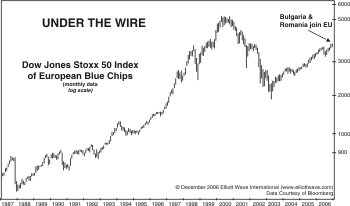
Bulgaria and Romania can thank the rally off the summer lows for their EU membership. Back in May, a few days after the start of a big break in global stock prices, European Commission suddenly slammed on the brakes. Here’s what John Palmer, a writer with the European Policy Center said at the time:
It is an open secret that both countries (but particularly Bulgaria) fall well below the standards expected of EU member-states across the field of justice, policing and state corruption. The commission is right not to facilitate early entry by simply shutting its eyes to the serious problems which exist in the governance of both countries. Lower standards of justice, human rights and the rule of law have an infectious character which would not leave existing EU states untouched.
On Sept. 26, when the market was back in the clear uptrend shown by the last few bars on this index of 50 of European blue chips, the European Commission released a report giving the final go-ahead to the two countries. As The Elliott Wave Principle of Human Social Behavior revealed back in 1999, the unification of Europe is one of the great accomplishments of the long bull market. Click here to see how the surge higher in the European stocks has waxed (and occasionally waned) in time to the upward push of stock prices.
"The accession of Bulgaria and Romania will mark an historic achievement: the completion of the fifth enlargement of the European Union, which further pursues the reunification of our European family," said José Manuel Barroso, president of the commission. The two countries applied back in 1995, when the most feverish phase of the long bull market, was getting underway. The larger bull market dates back to World War II. What a difference six decades of rising social mood can make. At the start of the advance, Europe was tearing itself apart. Now even the eastern European "laggards" are acceding to the union. Even though Romania or Bulgaria were not considered sufficiently prepared to join, they got in.
But the expansionary forces are clearly starting to wane. Last May, when the EU initially hesitated on the entry of Bulgaria and Romania, Palmer noted, “There is little doubt that the dynamic which drove the enlargement of the European Union in the decade after the fall of the Berlin wall is weakening.” EU leaders are “divided on the bloc's future.” Divisions over further expansion and how to revive the EU constitution (see arrow marking French and Dutch rejections in 2005 on the chart) represent another glaring divergence to the trend in stock prices, which continued on to new highs in December as talks stalled. No, it’s not World War III, but it is a drastic departure from the correlation shown in the chart. If the article at left is right, the entry of Romania and Bulgaria might even be as exclusionary (i.e. bearish) as it is inclusionary. It states that they are being admitted at the “insistence of France;” France wants more countries with a preference for French. In other words, it wants it own faction. So, its victory is really an early sign of the fragmentation that rules in a falling social mood. Few analysts currently imagine anything worse than stagnation, but the size and strength of the emerging bear market suggest something far worse. In fact, the reactionary power of the decline means much of what’s come together in Europe will come apart in coming years.
|
